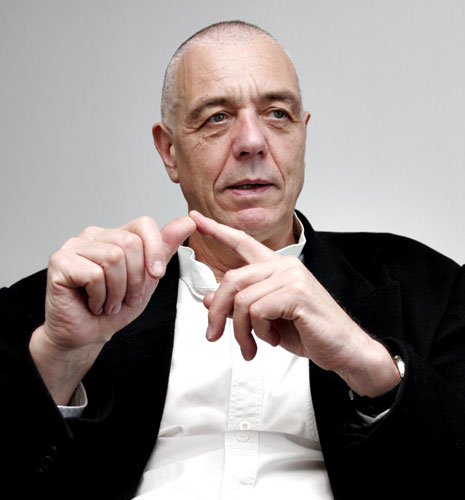German finds new path to bridge cultures
Updated: 2012-04-15 08:35
By Liu Lu (China Daily)
|
|||||||||||
Over the last 35 years, Michael Kahn-Ackermann has witnessed the remarkable changes and strong economic resurgence of China.
Now Kahn-Ackermann, has stepped away from a long and illustrious career as the president of the Goethe-Institute China to join the Confucius Institute, a non-profit organization dedicated to promote Chinese language and culture worldwide, as senior adviser.
 |
|
Michael Kahn-Ackermann, senior adviser to the Confucius Institute, says China should place more emphasis on cultural imagination and creativity. [Photo/China Daily] |
The new role, says the 66-year-old German Sinologist, give an opportunity to help the world better understand contemporary China, particularly Chinese culture, through frequent cross-cultural exchanges.
"China has developed its economic and political prowess, but is still relatively weak when it comes to culture in the global arena," he says.
He says China needs to ensure that its cultural exports promote creative cooperation and are also in sync with what the rest of the world wants.
"Chinese people love to see Hollywood films. It is not because Barack Obama wants them to see it, but because the Hollywood producers are masters of the global culture game and know what kind of stories would appeal to global audiences."
Though China has an attractive culture, it still needs to offer something that others are curious and interested about, Kahn-Ackermann says.
Setting up Confucius Institutes is a smart move by China to expand its cultural influence, he says, as these institutions are patterned more on the lines of what the world wants.
"There is now more than ever a global need to learn Chinese, as people are getting more and more curious about China, due to its rapid economic and political strides. It is natural that they want to know more about China through the language," Kahn-Ackermann says.
He says the Confucius Institute is not only an innovation but an institutional concept model developed by China that other nations can emulate. Unlike other independently organized language and culture promotion centers such as France's Alliance Francaise and Germany's Goethe-Institute, the Confucius Institutes cooperate with established universities, colleges and secondary schools around the world. Every institute is managed by the combination of a Chinese director and a foreign counterpart.
"Having two people with completely different cultural backgrounds and experience of working together in one organization is a very complicated and difficult thing. It needs a lot of mutual understanding, patience, goodwill and learning capacity.
By setting up more such institutions globally, Kahn-Ackermann says China can also enhance its soft power considerably.
"Soft power in my understanding is the capacity to cooperate. It is not to make you believe what I believe or try to convince you that my morals are better than yours. Nor is it a means of conquering without weapons, but rather of successful and creative cooperation."
He says that China in recent years has built up thousands of different cultural infrastructure such as huge museums, concert halls and theaters, but more emphasis needs to be given to cultural imagination and creativity.
"Many of the top Hollywood directors did not begin their careers there, but rather as independent directors who were welcomed with open arms by Hollywood. That is what China needs to learn from the Western countries in their soft power construction."
At the same time China also needs to be more open to imported culture rather than viewing it as a threat and win trust from other countries by showing the world the complexity of Chinese culture.
He says it is not necessary for a person belonging to a different culture to love Chinese culture, but if their curiosity is sparked, they will be keen to understand the culture.
"When people find out that Chinese culture is much more complicated than Western media clichs, they will be interested in China, its people and the different ways of doing things. This is real soft power."
liulu@chinadaily.com.cn
Today's Top News
President Xi confident in recovery from quake
H7N9 update: 104 cases, 21 deaths
Telecom workers restore links
Coal mine blast kills 18 in Jilin
Intl scholarship puts China on the map
More bird flu patients discharged
Gold loses sheen, but still a safe bet
US 'turns blind eye to human rights'
Hot Topics
Lunar probe , China growth forecasts, Emission rules get tougher, China seen through 'colored lens', International board,
Editor's Picks

|

|

|

|

|

|





